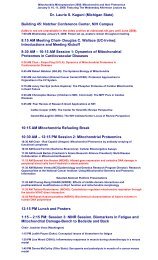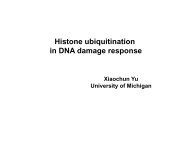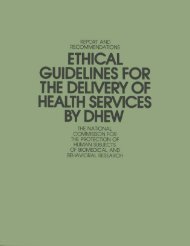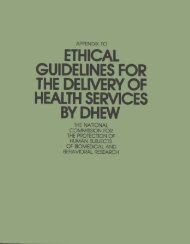RESEARCH ON THE FETUS - National Institutes of Health
RESEARCH ON THE FETUS - National Institutes of Health
RESEARCH ON THE FETUS - National Institutes of Health
Create successful ePaper yourself
Turn your PDF publications into a flip-book with our unique Google optimized e-Paper software.
fetus-going-to-term. Indeed, it was also suggested that any research involving<br />
fetuses-to-be-aborted must also involve fetuses-going-to-term. Others argue<br />
that, while a woman's decision for abortion does not change the status <strong>of</strong> the<br />
fetus per se, it does make a significant difference in one respect--namely, in<br />
the risk <strong>of</strong> harm to the fetus. For example, the injection <strong>of</strong> a drug which<br />
crosses the placenta may not injure the fetus which is aborted within two weeks<br />
<strong>of</strong> injection, where it might injure the fetus two months after injection. There<br />
is always, <strong>of</strong> course, the possibility that a woman might change her mind about<br />
the abortion. Even taking this into account, however, some members argue that<br />
risks to the fetus-to-be-aborted may be considered "minimal" in research which<br />
would entail more than minimal risk for a fetus-going-to-term.<br />
There is basic agreement among Commission members as to the validity <strong>of</strong><br />
the equality principle. There is disagreement as to its application to individual<br />
fetuses and classes <strong>of</strong> fetuses. Anticipating that differences <strong>of</strong> interpretation<br />
will arise over the application <strong>of</strong> the basic principles <strong>of</strong> equality<br />
and the determination <strong>of</strong> "minimal risk," the Commission recommends review at<br />
the national level. The Commission believes that such review would provide the<br />
appropriate forum for determination <strong>of</strong> the scientific and public merit <strong>of</strong> such<br />
research. In addition, such review would facilitate public discussion <strong>of</strong> the<br />
sensitive issues surrounding the use <strong>of</strong> vulnerable nonconsenting subjects in<br />
research.<br />
The question <strong>of</strong> consent is a complicated one in this area <strong>of</strong> research.<br />
The Commission holds that procedures that are part <strong>of</strong> the research design should<br />
be fully disclosed and clearly distinguished from those which are dictated by<br />
the health care needs <strong>of</strong> the pregnant woman or her fetus. Questions have been<br />
raised regarding the validity <strong>of</strong> parental proxy consent where the parent(s)<br />
have made a decision for abortion. The Commission recognizes that unresolved<br />
problems both <strong>of</strong> law and <strong>of</strong> fact surround this question. It is the considered<br />
opinion, however, that women who have decided to abort should not be presumed<br />
to abandon thereby all interest in and concern for the fetus. In view <strong>of</strong> the<br />
close relationship between the woman and the fetus, therefore, and the necessary<br />
involvement <strong>of</strong> the woman in the research process, the woman's consent is considered<br />
necessary. The Commission is divided on the question <strong>of</strong> whether her<br />
consent alone is sufficient. Assignment <strong>of</strong> an advocate for the fetus was proposed<br />
67











